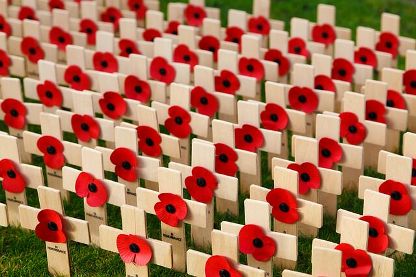Posted 2014 and 2015
11th day 11th month @11am
I have decided that until the issue of soldiers with brain injury, around the world, is adequately addressed I will repost this each Remembrance Day.
First published in 2014.
In November 2014 after several weeks of trying to prepare an article for Remembrance day: “traumatic brain injury in soldiers – a brief history”
The writing would not flow. Everything I read made me cranky.
It seems we have not learned all we could from history, about the lifelong support that many soldiers with brain injury and their families need.
The 11th hour – of the 11th day – of the 11th month is a time when the end of World War I is commemorated. When the millions of lives changed by war, across the world, are remembered.
Instead of my planned, commemorative, historical, piece I am now letting off steam with a personal ‘Rant for Remembrance Day’, particularly about the lack of support for soldiers with Brain Injury.
Significant advances have been made in enabling soldiers to survive brain injury, yet we still have a long way to go to ensure those soldiers are able to live a good life.
 I don’t believe it is fair and just that a person is employed by their country, to fight for that country, and then is not taken good care of when returning home injured!
I don’t believe it is fair and just that a person is employed by their country, to fight for that country, and then is not taken good care of when returning home injured!
Earlier I wrote an article based around the title of a Bruce Springsteen song “We Take Care of Our Own” about whether or not we take care of people with brain injury including soldiers. Do we?
There are significant, non-apparent, and often lifelong affects of war include post traumatic stress disorders, mental health issues and traumatic brain injury in soldiers. There is a need for long term quality rehabilitation, treatment, and lifelong support to assist veterans live a good life.
Why are we not meeting those needs? Do we take care of our own? No we still do not seem to do so.
 How dare being sent to fight for one’s country lead to homelessness, poverty, ill-health!
How dare being sent to fight for one’s country lead to homelessness, poverty, ill-health!
While preparing this, I heard a news report (not the first time) about the already large and still growing population of returning soldiers who are homeless in Australia. Many of these soldiers have brain injury, mental illness, post traumatic stress disorders. In an article about the 10 million+ people in the world with brain injury the following article “A Guide to U.S. Military Casualty Statistics: Operation New Dawn, Operation Iraqi Freedom, and Operation Enduring Freedom” describes 287,911 service people with brain injury.
This is a familiar story following World War I, World War II and on and on and on.
Huge numbers. A lot of learning opportunities. Why do we not have better lifelong services to ensure the health and well-being of veterans?
 It does not make sense that we send millions of men and women off to instigate, and experience violence then expect them to switch off what they have learned and seen, on their return home without help.
It does not make sense that we send millions of men and women off to instigate, and experience violence then expect them to switch off what they have learned and seen, on their return home without help.
A few days ago I heard a woman on radio tell her story of generations of family violence apparently perpetuated by war service.
Her grandfather fought in World War I and came back a changed man. Violent, distressed, and with a serious alcohol problem. Her father went off to fight in World War II and came back a changed man. Violent, distressed, and with a serious alcohol problem. Her husband was a Vietnam veteran. Yes same outcome and with further damage from the lack of recognition and support on returning home.
The woman talked about men (and women) leaving a peaceful country, going off the fight and kill; to see things that live in your mind forever. And be expected to come home and fit right back in.
Why after so many years, and so many wars do we not provide better psychological and physical support back into civilian life?
 We don’t learn. History repeats itself over and over and over.
We don’t learn. History repeats itself over and over and over.
Long term health impacts including traumatic brain injury in soldiers have happened throughout history and continue throughout the world today. Wars have always and continue to be fought throughout the world. And in every war, anywhere in the world, people acquire brain damage.
In most studies I read about traumatic brain injury in soldiers they more often than not it concluded that there was a lack of ongoing support. This led to a detrimental long term effect on soldiers affected.
Why are we not learning lessons and improving treatment and practice?
 Why focus on increasing the survival rate after traumatic brain injury in soldiers without also focussing on increasing quality of life; being able to live a good life?
Why focus on increasing the survival rate after traumatic brain injury in soldiers without also focussing on increasing quality of life; being able to live a good life?
The survival rate after traumatic brain injury in soldiers continues to improve with better protective gear and better neurosurgical procedures. This improvement in survival is not accompanied by creating a meaningful life with quality of lifelong supports.
Many years ago a man with brain injury said “If you are going to put millions of dollars into keeping me alive, don’t then bury me alive.” So much more than survival.
 How can diagnoses of traumatic brain injury in soldiers still be missed, or wrong?
How can diagnoses of traumatic brain injury in soldiers still be missed, or wrong?
Lack of clear diagnosis leaves soldiers without hope of the right support, at the right time, in the right way. It can leave soldiers thinking this is something happening to them only, something they cannot talk about.
With all the technology, diagnostic tools and tests available today, why is the diagnosis of traumatic brain injury in soldiers being missed or misdiagnosed? It is not only the undiagnosed brain injury, post traumatic stress, mental illness, depression and anxiety disorders.
With so much evidence available on the impact of war: blast injuries, violent acts witnessed, trauma: why is diagnoses still missed, confused, unclear?
And Finally
This article is purely about my reaction to the impact of war on people, in this instance the soldiers sent to fight. It does not reflect my support (or not) for war, nor my views on war and violence.
I discovered a range of information and resources both current and historical while researching the history of traumatic brain injury in soldiers. This led to this rant today.
Meantime forgive the lack of backing up my thoughts today – it is my own ‘Rant for Remembrance Day’.
I also realise there are some great supports and programs around the world to help soldiers. Creating A Mask was one I wrote about here. Please share others in the Comments below.
Please feel free to share your own rant here. You are free to disagree or agree with me!



Thank you for your rant Melanie! I thought it was very calm and not deserving of the title “Rant”. As a sufferer of TBI, this has crossed my mind so very often. With the recent goings on in the world, it just seems that us humans that call ourselves the most advanced race is basically the least advanced race!
Thankyou for taking time to commment Michelle. I do try to write calmly so I am pleased you did not think it too much of a “rant”. We have a long way to go in providing proper support for people with brain injury, including soldiers.
Hi Melanie,
I thought your article hit the nail on the head. I personally grew up during the 70’s and 80’s with friends of my father and neighbours who were return service men . As a little kid you could sense something wasn’t right . The amount of family brake ups including my own a causalities of these men and women, who saw things none of us would never understand . We must care for these people who, gave their all for us. From Vietnam and now Iraq and Afghanistan the Injured deserve a good life and not be one of the many homeless or taken by alcohol. Thanks for your rant
Thank you Matthew for your comments and support of my article. I think that term “a good life” is what we should be striving to provide. It is distressing to see returned service personnel featuring so prominently in statistics of homelessness and alcohol.